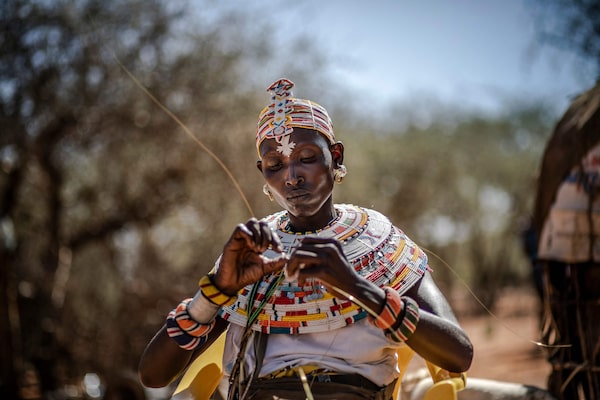If you’re reading this on the web or someone forwarded this e-mail newsletter to you, you can sign up for Globe Climate and all Globe newsletters here.
Good afternoon, and welcome to Globe Climate, a newsletter about climate change, environment and resources in Canada.
The sun’s warmth always gives us a smile. That’s because the sun is the largest source of energy on earth. And besides making us happy, the sun’s rays also power about 95 per cent of everything we do. The sun is also why the wind blows. It may surprise you, but the gasoline you put in your car also comes from the sun.
Appreciate the sun a little extra today and celebrate its starring role in our lives.
Let’s Talk Science and the Royal Society of Canada have partnered to provide Globe and Mail readers with relevant coverage about issues that affect us all – from education to the impact of leading-edge scientific discoveries.
Now, let’s catch you up on other news.
Noteworthy reporting this week:
- World: Unprecedented heat wave leaves Indian farmers devastated and desperate
- B.C. disasters: Ottawa confirms $416-million disaster payment to B.C. for last year’s wildfires
- Interview: Climate columnist Adam Radwanski speaks with Environment Minister Steven Guilbeault about setting national climate-change targets
- Energy: Parkland’s B.C. refinery plans $600-million expansion of renewable fuel production. Meanwhile, Alberta’s top court rules Ottawa’s environmental assessment law is unconstitutional
- From The Narwhal: Why Ontario’s plans to electrify GO Transit’s train lines are running late
A deeper dive
Rejigging the fishing supply chain
Lindsay Campbell is an Ottawa-based journalist whose work focuses mainly on food and farming’s intersection with the environment. For this week’s deeper dive, she speaks with two chefs turned fishmongers whose business, Affinity Fish, aims to better connect shoppers with their seafood.
In recent months, severe weather events have taken a toll on our food systems, diminishing supply and contributing to price hikes on groceries. We know this will continue as climate change runs its course. But the journey food takes before it reaches consumers is equally important to consider. What transpires at each pit stop through the supply chain can either alleviate or intensify the impacts of climate change.
Chefs turned fishmongers Jon Klip and Matt Taylor have spent nearly two years trying to build something they believe is better than the status quo for sourcing and selling local fish from the Great Lakes.
Matt Taylor (left) and Jon Klip (right), stand for a photograph while fishing aboard the Benjamin-Charles fishing boat on Lake Huron off the shores of Southhampton, Ont.Ryan Carter/The Globe and Mail
In covering their efforts, I was struck by their genuine adoration and appreciation for fish as more than a food source. Mr. Klip’s apartment is stocked with fish books, and his walls are decorated with guides of freshwater and saltwater species. Mr. Taylor’s body is inked with several portraits of the gill-bearing animals onto his arms and legs. Conversations with both are like talking to fish encyclopedias.
Their philosophy to handle a product with care for optimal quality is no doubt informed by their training as chefs. But the thoughtfulness and attention to every detail in how that is executed is a result of their affinity for the product (as the name of their business, Affinity Fish, suggests).
There’s research that supports their work, showing that greater reliance on local freshwater fisheries has environmental benefits, and helps create stronger, sustainable food systems. This makes sense if we think about how many regional food systems stayed intact and were relied upon when the pandemic unravelled global supply chains. Mr. Klip and Mr. Taylor have also eliminated middlemen responsible for fuel-related gas emissions by transporting the fish to processing facility and then retailer.
As many people remain disconnected from their food source, it’s unlikely that these factors hold much weight in their buying behaviours. But as I think about the future success of Affinity Fish, my feeling is that Mr. Klip and Mr. Taylor’s deep-rooted admiration for these creatures will be what allows their model to exist for the long term. People need a connection and a story care about something, like food choices, and I see them being able to captivate and entice others to stick with a way of consuming fish more sustainably.
What else you missed
- Blue marshlands store as much carbon as green forests: study
- Parks Canada capital budget falls as agency works on new plan for crumbling assets
- Rise of online shopping, shipping drives GM into race to electrify delivery products
- Environmental safeguards built into B.C. mine approvals being whittled down by amendments: study
- Ontario Greens propose more independence for top doctor, climate plan
- Environmental groups sue Canada over Bay du Nord oil project approval
- The Alberta government is fielding a flood of applications from those who want to use the province’s underground caverns for carbon capture
Opinion and analysis
Gary Mason: Alberta court opinion on pipeline law sees a Trojan horse where none exists
Coree Tull: B.C.’s unprecedented weather disasters require bold investment in watershed security
Green Investing
The Great Canadian ESG Championship is on
It’s coming down to the wire for money managers vying to be in charge of a total of $90-million of ESG-themed investment portfolios. Submissions for the high-stakes contest, from both big-name and little-known portfolio players.
There were 60 who devised their best strategies in hopes of setting up portfolios for a group of charitable foundations, endowments and private trusts in what’s known as the Great Canadian ESG Championship. Now the field has been narrowed to 11, and next month they will give presentations to a panel of judges hoping to win the right to manage three funds on behalf of the investors.
Also: Climate mitigation in capital cities costs. Is building new ones the solution?
Making waves
Each week The Globe will profile a Canadian making a difference. This week we’re highlighting the work of Paul Klein, who’s helping businesses develop human-centred climate solutions.

Paul KleinSupplied
Hi, I’m Paul Klein, founder and CEO of Impakt, a B Corp based in Toronto that helps corporations solving social problems. I’m also the founder of the Impakt Foundation for Social Change, a charitable organization that creates pathways to employment for newcomers to Canada.
We’ve collaborated with McCain Foods on their Farms of the Future initiative which will advance sustainable farming practices and innovative agricultural technologies. And, my new book Change for Good: An Action-Oriented Approach for Businesses to Benefit from Solving the World’s Most Urgent Social Problems has just been released.
In addition to reducing emissions, switching to renewable energy and eliminating waste, businesses should also be collaborating with vulnerable people to develop climate change solutions that will address pressing social problems such as food insecurity, livelihood insecurity and loss of cultural identity.
- Paul
Do you know an engaged individual? Someone who represents the real engines pursuing change in the country? Email us at GlobeClimate@globeandmail.com to tell us about them.
Photo of the week

Bariti Leorto, a Samburu woman, works making traditional Samburu ornaments and jewelry out of beads next to a house in Kalama Conservancy, Samburu County, Kenya on May 10, 2022. The bead work will be sold through the Conservancy both in the local and international market creating a profitable income for the pastoralists Samburu families that have seen their traditional lifestyle threatened due to climate anomalies and the deterioration of rangelands. Kenya has lost nearly 70% of its wildlife in the past 30 years. Many conservancies in Kenya are transforming their models towards a community-based approach that allows local communities to improve their livelihoods while promoting conservation and facing the impact of climate change that threatens severely many of these protected areas.LUIS TATO/AFP/Getty Images
Guides and Explainers
- Want to learn to invest sustainably? We have a class for that: Green Investing 101 newsletter course for the climate-conscious investor. Not sure you need help? Take our quiz to challenge your knowledge.
- We've rounded up our reporters' content to help you learn about what a carbon tax is, what happened at COP 26, and just generally how Canada will change because of climate change.
- We have ways to make your travelling more sustainable and if you like to read, here are books to help the environmentalist in you grow, as well as a downloadable e-book of Micro Skills - Little Steps to Big Change.
Catch up on Globe Climate
- Scientists embark on their annual trek to measure glacier loss
- Inuit knowledge and science skills fight climate change in the Far North
- Across the African continent, climate crises inflict suffering on millions
- An investigation into the murky world of ESG ratings
We want to hear from you. Email us: GlobeClimate@globeandmail.com. Do you know someone who needs this newsletter? Send them to our Newsletters page.